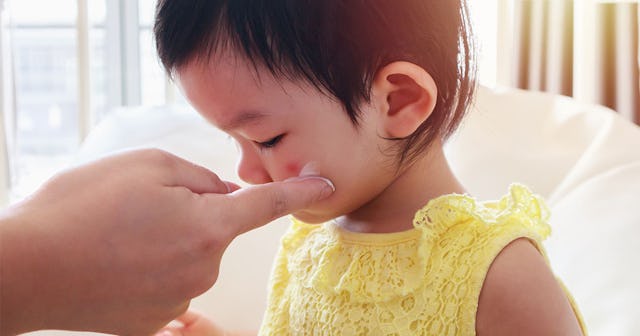How Eczema Can Potentially Lead To Food Allergies In Children

We all know children with food allergies. They have become much more prevalent in the last 20 years and have increased by 50%. Experts say that while millions of children suffer from these allergies, they are not born with them as babies. In fact, the allergies develop as a child grows. The most common, and often most serious, allergens, which are responsible for about 90% of food allergies, are: milk, egg, peanut, soy, wheat, tree nut, shellfish, fish, and sesame. As parents, it is helpful to know what we can do to help mitigate food allergies for our children.
Scary Mommy spoke with Dr. Alok Patel, pediatric hospitalist at Stanford University and UCSF, to learn more about food allergies and what we may not be aware of.
First, childhood eczema can contribute to a baby developing a food allergy. Dr. Patel explained that babies with eczema are more than 600% more likely to have a food allergy than those without. Eczema itself is not an allergy, but a number of conditions that cause the skin to become inflamed, itchy and red. When the skin is irritated and babies scratch, the skin can become cracked.
“Tiny particles of food in the environment can enter into the body and cause sensitization to particular foods. About 20% of children have eczema and about 30% of those have a food allergy. As further proof of causal relationship, children with food allergies are two to four times as likely to have other allergic conditions, such as asthma or eczema, according to FARE, Food Allergy Research & Education,” he said.
This can be things like peanut dust or other ever-present food particles in the environment. To help prevent the skin from becoming cracked, he suggests that parents keep their children’s skin well moisturized, creating a healthy and protective barrier on the skin, but not to use lotions that have food ingredients. He explained that eczema treatment normally uses a combination of bathing, moisturizing and at times topical medications, to keep a child’s skin protected. As parents do their best to avoid airborne-food particle exposure, increasing food exposure in the stomach is key, Patel suggested.
You may have heard that restricting certain foods during pregnancy can lesson your child’s chance of developing a food allergy. There is no research to back this up, Dr. Patel said. But there is good news about breastfeeding: While the jury is still out as to whether breastfeeding can directly stop a food allergy from developing, it definitely helps with eczema.
Kwangmoozaa/Getty
“Breastfeeding can potentially reduce the risk of developing eczema in the first three months of life. That, in turn, can lower your child’s chance of developing a food allergy,” he said.
Food allergies can be scary and sometimes deadly, but there are a percentage of children who actually outgrow them. Between 60% and 80% of children with an egg or milk allergy will outgrow it by the time they turn 16. About 65% of children who are allergic to grain or oats will not be allergic by age 12. Outgrowing other allergies, Patel said, is less common. Nuts are particularly problematic, with about 20% of children losing allergies to peanuts and 14% to tree nuts. The least likely allergy to out grow is a fish or shellfish allergy.
If your family has a history of allergies, be sure to talk to your doctor about the best way to keep your children safe and for things that you need to watch for in case of an allergic reaction. It is also important to note that if a child has one food allergy, another might develop, so be cautious.
Delaying introduction to allergen foods does not prevent allergy. “That’s why the new USDA Guidelines suggest that introducing common allergens regularly, like peanuts, egg, cow milk products, tree nuts, wheat, crustacean shellfish, fish, and soy, at 4-6 months can reduce the risk of your baby developing a food allergy – so don’t delay,” said Patel.
He explained that it is a smart thing for parents to do, just like a proper car seat, smoke alarms in your home, and having your child wear a helmet when they ride their bike. Being a father to a five-month-old himself, he took her cues to start introducing new foods. He understands the science and knows how important to introduce the nine foods that cause the most allergies.
“In the past month, she has tried a whole host of allergenic foods, pureed or mashed, of course. I’m a terrible cook but I did manage to make her a soufflé as a method of egg introduction. She also loves hummus, sweet potatoes, vegetable puree, raw limes — the face she makes is hilarious — and basically anything we place in front of her,” he said.
It’s nice to hear from doctors who are parents too. They are living their lives with their children and just trying to do the best for them just like we are every day. We are all in this parenting thing together. Allergies can be scary, but knowledge is power. Do your best to try and prevent them, but if your child does develop an allergy, learning as much as you can about it and empowering your child with what they need to know will help to keep everyone safe.
This article was originally published on